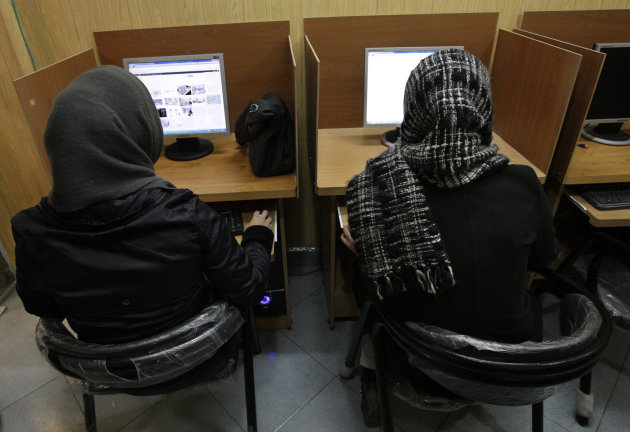Iran blocks Gmail, sparks a backlash from users -- including members of parliament: http://yhoo.it/Qt9s7W Push to create alternate Web
6:23 PM - 30 Sep 12 · Details
- Enlarge Photo
 Associated Press/Vahid Salemi, File - FILE- In this Monday, Feb. 13, 2012 file photo, Iranian women use computers at an Internet cafe in central Tehran. Iran’s cyber monitors often tout their efforts to fight …more
Associated Press/Vahid Salemi, File - FILE- In this Monday, Feb. 13, 2012 file photo, Iranian women use computers at an Internet cafe in central Tehran. Iran’s cyber monitors often tout their efforts to fight …more
RELATED CONTENT
 Enlarge PhotoFILE - In this Monday, Feb. 13, …
Enlarge PhotoFILE - In this Monday, Feb. 13, …
TEHRAN (AP) — Iran's cyber monitors often tout their fight against the West's "soft war" of influence through the Web, but trying to block Google's popular Gmail appeared to be a swipe too far.
Complaints piled up — even from email-starved parliament members — and forced authorities Sunday to double down on their promises to create a parallel Web universe with Tehran as its center.
The strong backlash and the unspecific pledges for an Iran-centric Internet alternative to the Silicon Valley powers and others highlight the two sides of the Islamic Republic's ongoing battles with the Web. It's spurred another technological mobilization that fits neatly into Iran's self-crafted image as the Muslim world's showcase for science, including sending satellites into orbit, claiming advances in cloning and stem cell research and facing down the West over its nuclear program.
But there also are the hard realities of trying to reinvent the Web. Iran's highly educated and widely tech-savvy population is unlikely to warm quickly to potential clunky homegrown browsers or email services. And then there's the potential political and economic fallout of trying to close the tap on familiar sites such as Gmail.
"Some problems have emerged through the blocking of Gmail," Hussein Garrousi, a member of a parliamentary committee on industry, was quoted Sunday by the independent Aftab-e Yazd daily. What he apparently meant was that many lawmakers were angry and missing their emails.
He said that parliament would summon the minister of telecommunications for questioning if the ministry did not lift the Gmail ban, which was imposed last week in respond to clips on Google-owned YouTube of a film mocking the Prophet Muhammad that set off deadly protests across the Islamic world.


 Yahoo! News
Yahoo! News 





